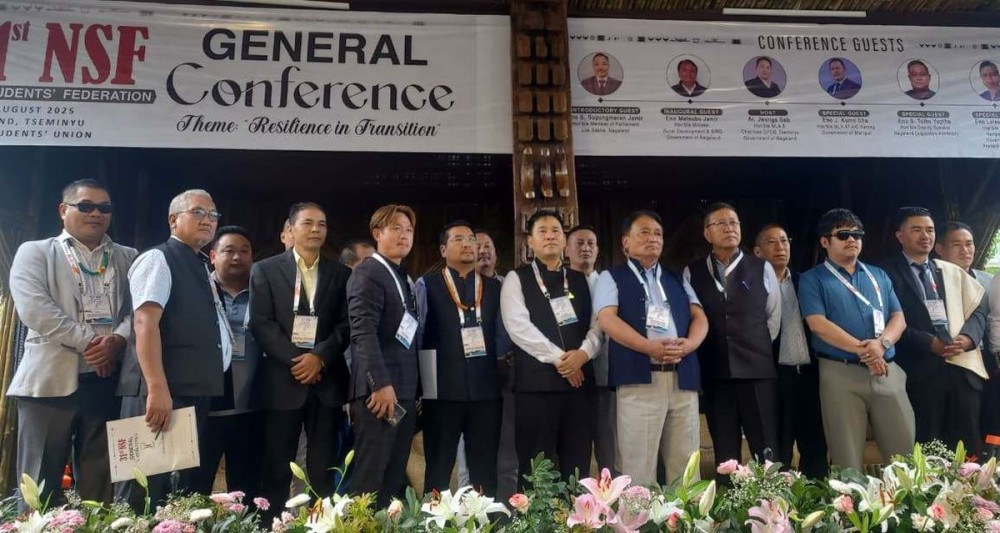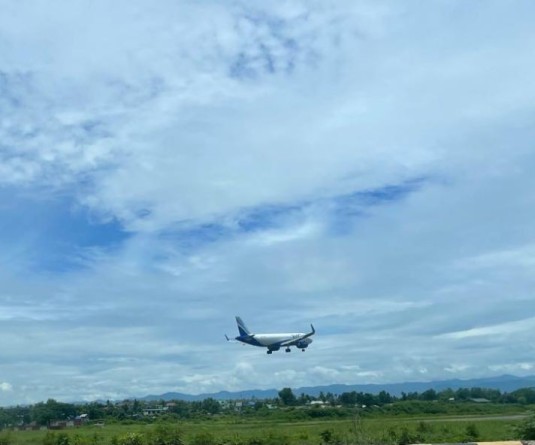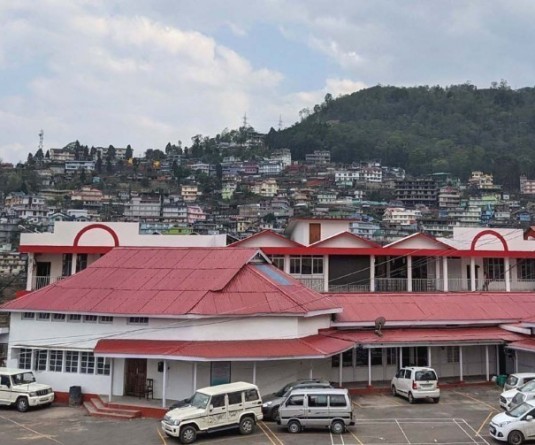Rural Development & SIRD minister Metsubo Jamir and others during inaugural session on August 28. (Morung Photo)

Our Correspondent
Tseminyu | August 28
Nagaland’s Rural Development & SIRD Minister, Metsubo Jamir today said “As Nagas, with our unique history and cultural identity, we too have much to offer to the world. Our values of community, respect for tradition, and resilience in adversity are lessons worth sharing on the global stage that can be brought about by imparting a sense of social responsibility that transcends geographical boundaries and ethnic divisions.”
In his address at the inaugural session of the 31st General Conference of the Naga Students’ Federation (NSF) at Tseminyu, Jamir stressed that global education and cultural preservation are not opposing forces. “They are complementary. One opens the mind: the other anchors the soul. And together, they empower individuals to walk forward in the world,” he said.
Yet as we look ahead, Jamir said, “We should always remain alert and vigilant to introspect on who we are and maintain an uncompromising stand on preserving our identity.”
Stressing on the need of the hour to preserve the cultural identity, he said “Identity encompasses the traits, customs, and values that define us within our specific groups be it nationality, ethnicity, religion, or community.”
It is formed through our knowledge of our experiences, and our social bonds. This identity evolves as we engage cultures, yet it remains a source of strength, a constant reminder of who we are in a world that is fast changing, he said.
Stating that preserving cultural identity is not merely a nostalgic act, the minister said “It is a vital foundation for emotional well-being and self-esteem, a reminder of who we are as a people, as a community. It fosters a sense of belonging, of knowing where we come from and where we are going. And most importantly, for a society as diverse as the Nagas, it creates social cohesion that transcends our petty differences and strengthens intergenerational continuity that serves as a compass in times of change and uncertainty.”
A well-defined identity acts as a framework for making consistent choices in line with one's values, and enhances resilience in the face of adversity or change, allowing individuals to navigate life's challenges with confidence, he said.
Expressing happiness over the renaissance and the revival of indigenous practices, mother tongues and knowledge systems, he said “By engaging in traditional practices, learning and teaching ancestral skills, supporting community initiatives, and staying true to our core values, we strengthen not only our own sense of self, but our collective resilience.”
Jamir maintained that preservation our cultural identity and heritage allows us to remain rooted, while allowing us to hold our heads up high wherever we go.
Touching on education, he said “In today's interconnected world, education is no longer confined to textbooks and classrooms. It has become a powerful tool to equip individual, especially the youth, to navigate challenges in an ever changing world, and to participate meaningfully in building a better and more inclusive future.”
Stating that education and learning goes beyond academic achievement, he said “It nurtures essential skills such as critical thinking, collaboration, intercultural understanding and adaptability.”
Through such education, he said “our young learners become aware of the larger issues affecting our world from poverty and inequality to climate change and human rights.
“This approach instils in learners the values of peace, respect, inclusivity, and social justice. It teaches us to appreciate diversity, to understand different world views, and to resolve conflicts dialogue and mutual understanding,” Jamir added.
NSF remains conscience-keeper of Naga aspirations
Also addressing the gathering as host, MLA Jwenga Seb said that the NSF founded in October 1947 in Kohima, has been, and remains, the conscience and the conscience-keeper of Naga aspirations.
“You have, time and again, reminded us of our collective responsibilities -to our land, to our people, to our future,” Seb said in his address at the inaugural session.
Touching on this year’s theme “Resilience in Transition,” We, as a people, have for generations navigated transitions-social, political, economic, and cultural. Resilience does not mean resisting change; it means adapting with dignity, anchored in the values that define us, and ensuring that in every change, no one is left behind.”
May “Resilience in Transition” not only be a theme, but a lived commitment: that as we change, we adapt together, that as some rise, all rise, and that in unity we find the strength to secure a future where every Naga can lead a life of dignity, opportunity and peace, Seb said.
Stating that students & young leaders are well conversant with the technologies, knowledge and networks of the wider world, he said “Use this vantage to build bridges: between generations, between institutions, between our communities and the markets, universities and policymaking spaces that define the larger India and the world. Be the generation that strengthens customary practices that sustain our identity while innovating to meet the needs of our times.”
Touching on peace and dignity, Seb viewed “The pursuit of justice and recognition must be matched with the courage to hold peaceful dialogue and to protect the lives and livelihoods of our people.”
He encouraged the students to continue to occupy both spaces: be a moral chorus when wrongs exist, and be the architects of solutions when opportunities arise.
Stating that our collective efforts are aimed at sharing the rich Naga narrative and nurturing a sense of unity and cohesion among Nagas throughout our homeland, he said “ Together, we strive to celebrate our unique heritage where all Nagas stand united as one people, one nation.”
‘NSF striving for unified Lim and glory of our people’
NSF president Medovi Rhi said that NSF is not just an organization but the very heartbeat of the Nagas, striving for “our unified Lim and glory of our people.”
He said that the year 1947 stands enshrined in our legacy as the birth of the NSF under the chairmanship of Lt. Z. Ahu Zinyu.
Since its inception, Rhi said, NSF was built on the principles of unity among the Nagas and the “steadfast defense of our political and cultural rights.”
This enduring legacy now rests in the hands of the current generation and it is our solemn duty to safeguard it and pass it on to the generations to come, he said.
“We once again reaffirm our commitment to the vision of the NSF, not to deviate from the ideals and foundations upon which it came into being but to forge a renewed dedication to uphold its calling, stronger, united and embodying the resilience that has defined our people through generations, so that the world will know the Nagas not by division but by our enduring unity, strength and glory,” Rhi said.
Over the decades, he said, NSF have fought relentlessly for students’ and youth rights, opposing backdoor appointments, defending meritocracy, championing the rights and welfare of Naga students, safeguarding indigenous rights through reservation policies and standing against corruption.
He said that the menace of illegal immigration threatens the survival of our people, our economy and our future.”
“Our stand has never been against genuine citizens of India, but against unchecked illegal entry that deprives our own people of opportunities, jobs and dignity,” he said.
‘NSF championing education, unity, progress’
K. Elu Ndang, Convenor, Central Organising Committee said that the theme “Resilience in Transition” encapsulates the spirit of our people-a spirit defined by strength, adaptability, and unity as we navigate the evolving landscapes of our society, culture, and aspirations.”
For decades, he said, the NSF has been a steadfast voice for the Naga youth, championing education, unity, and progress while preserving our rich cultural heritage.
“This conference is not merely a gathering but a vibrant platform to reflect on our shared journey, address the challenges of our times, and chart a collective path forward,” said adding that “Resilience in Transition” called upon everyone to embrace change with courage, to honor our roots, and to empower our youth to lead with vision and purpose.
Over the course of this conference, Ndang said that NSF will engage in meaningful dialogues, share inspiring ideas, and deliberate on issues that matter most to the community.
From panel discussions fostering leadership and innovation to discussions on education, social justice, and sustainable development, this event is an opportunity to strengthen our resolve and inspire one another, he said.
May this 31st NSF General Conference be a beacon of hope, a catalyst for change, and a testament to the enduring spirit of the Naga people, Ndang said and challenged the gathering to make this conference a celebration of “our resilience and a stepping stone toward a brighter, united future.”
North East Students’ Organization (NESO) chairman Samuel B. Jyrwa and All Arunachal Pradesh Students’ Union (AAPSU) president Dozi Tana Tara also shared greetings at the inaugural session.
The inaugural session was chaired by N. Ejanthung Ngullie.
The session was followed by NSF federal assembly and panel discussion on “Youth as the bridge to our political future.”
The conference will continue till August 30.





